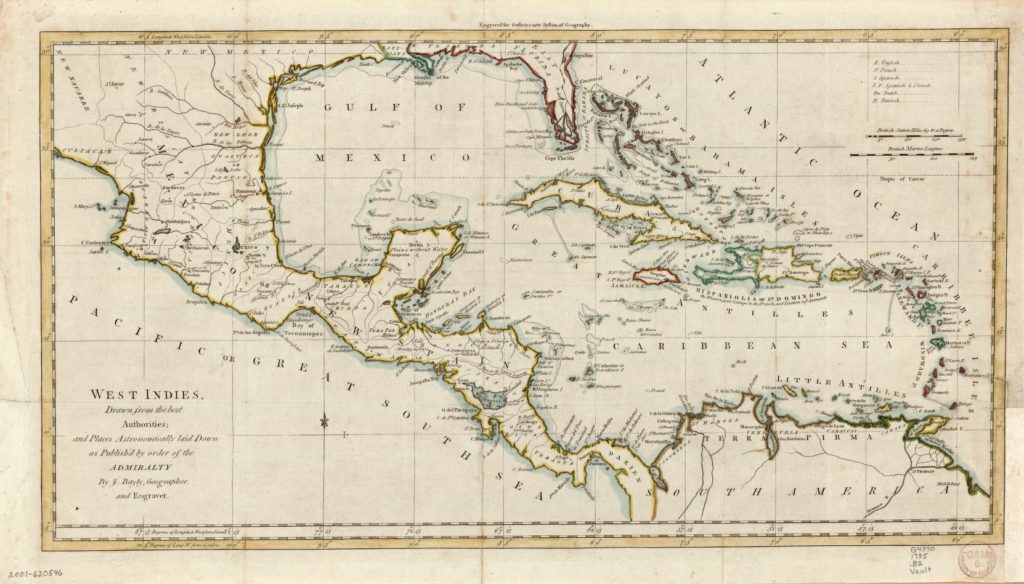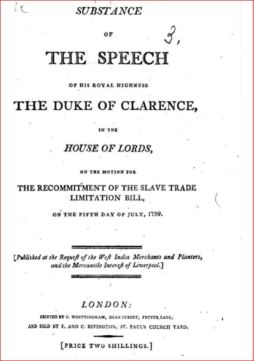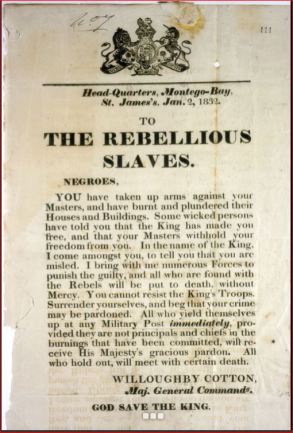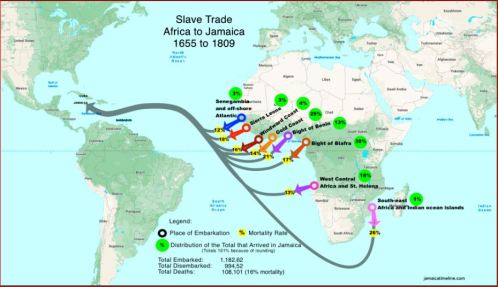“Slave Rebellion, Jamaica, 1832,” slaveryimages.org, “Dated Montego Bay, 2 January 1832, this poster or hand bill is an open letter to slave insurrectionists from the British military commander....This item was most probably printed in Jamaica, though it contains no imprint data.” The reigning UK monarch King William IV, born 1765, crowned King in 1830, died 1837, was a “British sea King, a maritime monarch.”
“Head-Quarters, Montego-Bay, St. James’s, Jan. 2, 1832″
“You have taken up arms against your Masters, and have burnt and plundered their Houses and Buildings. Some wicked persons have told you that the King has made you free, and that your Masters withhold your freedom from you. In the name of the King, I come amongst you, to tell you that you are misled. I bring with me numerous Forces to punish the guilty, and all who are found with the Rebels will be put to death, without Mercy. You cannot resist the King’s Troops. Surrender yourselves, and beg that your crime may be pardoned. All who yield themselves up at any military post immediately, provided they are not principals and chiefs in the burnings that have been committed, will receive His Majesty’s gracious pardon. All who hold out, will meet with certain death.”
WILLOUGHBY COTTON,
Maj. General Command
…………………………………………
Added: 1655-1809- Slave voyages from Africa to Jamaica. UK profiteers needed 10,000 new African slaves every year for their Jamaica sugar death camps:
Above map, British slave trading, points of departure from Africa to Jamaica. Source: Slave Voyages Database-Trans-Atlantic Slave Trade-Estimates, via JamaicaGreatHouses.com
………………………………………..
“Source: The National Archives, London (formerly, Public Record Office), CO 137/181″
……………………………………..
Additional credit:
“The proclamation is briefly discussed in Mary Turner, Slaves and Missionaries (University of Illinois Press, 1982), p. 16 (thanks to Gad Heuman).”
………………………………………
Added: UK said it couldn’t survive, couldn’t wage war, without profits from Caribbean slave labor: George III in 1779 said, “if we lose our Sugar Islands it will be impossible to raise Money to continue the War.”…“The Caribbean slave colonies, particularly Jamaica, powered the Atlantic trading system and served as the economic hub of the British Atlantic empire….Defending Britain’s sugar-producing Caribbean colonies, which generated revenue vital to national security, took precedence over reclaiming the [US] rebel territories."…King William IV in early 1800s was keen to integrate new technology of steam propulsion throughout the Royal Navy. (Oops-they say the steam engine kick-started the industrial revolution which allegedly caused so-called global warming, UK’s “historic climate debt,” and its “selfish appropriation of more than its fair share of the atmosphere.”)
1/21/2019, “Uncovering Royal Perspectives on Slavery, Empire, and the Rights of Colonial Subjects," georgianpapers.com, by Brooke Newman
“In 2017 I spent a month in the Royal Archives tracing how the Georgian monarchs responded to contemporary debates over the rights and duties of British colonial subjects and the slave trade during the age of Atlantic revolutions….
[During] George III’s reign, [1760 to 1820] Britain acquired new imperial territories,...lost the North American colonies following the American War of Independence in 1783, oversaw the establishment of the Sierra Leone colony in West Africa in 1787, and abolished the British slave trade in 1807….
 Map of the West Indies, 1785
Map of the West Indies, 1785
As George III saw it, attempting to compromise with the [US] rebels would signal British weakness and further encourage colonists throughout Britain’s overseas territories to challenge the authority of the Mother Country.
Although Britain fought to retain control of the American colonies, the Calendar of George III underscores the economic and strategic importance of the British Caribbean islands throughout the American War of Independence. Defending Britain’s sugar-producing Caribbean colonies, which generated revenue vital to national security,
took precedence over reclaiming the [US] rebel territories.
“Our Islands must be defended even at the risk of an Invasion of this Island,” George III stressed in a letter…dated September 13, 1779; “if we lose our Sugar Islands it will be impossible to raise Money to continue the War and then no Peace can be obtained but such as one as He that gave one to Europe in 1763 can never subscribe to” [2].
The Caribbean slave colonies, particularly Jamaica,
powered the Atlantic trading system and served as
the economic hub of the British Atlantic empire….
The British leadership concentrated on defending territories in the Caribbean and strategizing to act decisively if the opportunity arose to capture the most valuable sugar-producing island in the region: French Saint-Domingue. “Troops must be sent sufficient to secure Jamaica and Barbados, the Capital Islands belonging to this Island,” George III wrote to Lord Sandwich. Indeed, “we must run any risks rather than not Secure them if in addition to this it can be found practicable to undertake any attack on St. Domingue it would be highly desirable [3].” After the American colonies declared independence from Britain in 1783,
the Caribbean remained a region of vital significance to the Crown….
The surviving papers of George III’s third son, Prince William, Duke of Clarence (later William IV), who was the only member of the royal family to step foot in North America and the Caribbean while serving in the Royal Navy, help to shed light on the Crown’s perspectives on African slave trading and slavery in an era of revolutionary upheaval. In 1787, on a visit to Dominica, recaptured from France in 1783, Prince William saw colonial slavery firsthand and noted the island’s importance as a slave trading base. “The trade in slaves at this island is very great owing to our supplying the French with that valuable commodity,” he observed in a private letter to George III [4]….
 [Future King] Prince William, now the Duke of Clarence, emerged as a vocal defender of colonial slavery and a leading ally of the West India Committee in London. In 1799, in a reprinted and widely circulated pro-slavery speech delivered in the House of Lords, he referenced the long history of European involvement in the African slave trade and drew on his eyewitness knowledge of conditions in the Caribbean islands….The abolitionist campaign to end the slave trade, he argued, was not only radical and misguided,…but also deeply damaging to Britain’s national interests.”…
[Future King] Prince William, now the Duke of Clarence, emerged as a vocal defender of colonial slavery and a leading ally of the West India Committee in London. In 1799, in a reprinted and widely circulated pro-slavery speech delivered in the House of Lords, he referenced the long history of European involvement in the African slave trade and drew on his eyewitness knowledge of conditions in the Caribbean islands….The abolitionist campaign to end the slave trade, he argued, was not only radical and misguided,…but also deeply damaging to Britain’s national interests.”…
Notes
[1] GEO/MAIN/2564, His Majesty King George III to Lord North, 31 May 1777.
[2] GEO/MAIN/3518, His Majesty King George III to Lord Sandwich, 13 September 1779.
[3] GEO/MAIN/3520, His Majesty King George III to Lord Sandwich, 13 September 1779.
[4] GEO/MAIN/44732-44735, Prince William to His Majesty King George III, written aboard HMS Pegasus in the English Harbour, 7 January 1787.
Image Credits
Letter from Prince William to George III, written aboard HMS Pegasus in the English Harbour. Image provided courtesy of the Royal Archives, ref. GEO/MAIN 44732.
“Map of the West Indies,” by J. Bayly. London, 1785. Image provided courtesy of the Library of Congress.
“An Allegorical Representation of his Majesty King George the Third.” Mezzotint. Published by Laurie and Whittle, London, 1794. Image provided courtesy of the British Museum.
“Wouski,” by James Gillray. Hand-coloured etching. Published by Hannah Humphrey, New Bond St., January 23, 1788. Image provided courtesy of the British Museum.
Substance of the Speech of His Royal Highness the Duke of Clarence, in the House of Lords, on the Motion for the Recommitment of the Slave Trade Limitation Bill, on the Fifth Day of July, 1799. London, 1799.”
“”Dr. Newman is Associate Professor of History and Associate Director of the Humanities Research Center at Virginia Commonwealth University. She was awarded an Omohundro Institute Georgian Papers Programme Fellowship in 2017.”



………………………………………..
Extra: The UK “annexed Magnetic North to the British Crown on 1 June 1831.”
“[King] William [IV] also ran a distinctly naval court. Key household offices were deliberately allotted to sailors, while the naval heroes of the Napoleonic wars were prominent there….He also rewarded successful explorers, including naval Captain James Clark Ross, who annexed Magnetic North to the British Crown on 1 June 1831.”…
..................